Endothelial cells - Study guides, Class notes & Summaries
Looking for the best study guides, study notes and summaries about Endothelial cells? On this page you'll find 2843 study documents about Endothelial cells.
Page 4 out of 2.843 results
Sort by
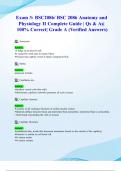
-
Exam 3: BSC2086/ BSC 2086 (Latest 2024/ 2025 Update) Anatomy and Physiology II Complete Guide | Qs & As| 100% Correct| Grade A (Verified Answers)
- Exam (elaborations) • 105 pages • 2024
- Available in package deal
-
- $11.49
- + learn more
Exam 3: BSC2086/ BSC 2086 (Latest 2024/ 2025 Update) Anatomy and Physiology II Complete Guide | Qs & As| 100% Correct| Grade A (Verified Answers) Q: Aneurysm Answer: •A bulge in an arterial wall •Is caused by weak spot in elastic fibers •Pressure may rupture vessel if elastic component fails Q: Stroke Answer: aneurysm in brain Q: Capillaries are... Answer: •Smallest vessels with thin walls •Microscopic capillary networks permeate all active tissues Q: Capil...
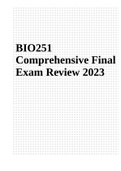
-
BIOS 251 Comprehensive Final Exam Review 2023
- Exam (elaborations) • 61 pages • 2023
- Available in package deal
-
- $15.49
- 2x sold
- + learn more
BIOS 251 Comprehensive Final Exam Review 2023. The following are all levels of the structural organization of the human body: 1. Organ 2. Organ system 3. Tissue 4. Cell 5. Chemical level Arrange the above levels from least complex to most complex: • A. 3, 4, 1, 2, 5 • B. 4, 5, 1, 2, 3 • C. 5, 4, 3, 1, 2 • D. 1, 2, 3, 4, 5 • E. 5, 4, 6, 2, 1 . Feedback: Good work; your answer is correct! Question 2 of 75 1.0/ 1.0 Points Which of the following statement(s) is(are) correc...
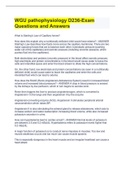
-
WGU pathophysiology D236-Exam Questions and Answers
- Exam (elaborations) • 32 pages • 2022
-
- $9.49
- 17x sold
- + learn more
What is Starling's Law of Capillary forces? How does this explain why a nutritionally deficient child would have edema? - ANSWER Starling's Law describes how fluids move across the capillary membrane. There are two major opposing forces that act to balance each other, hydrostatic pressure (pushing water out of the capillaries) and osmotic pressure (including oncontic pressure, which pushes fluid into the capillaries). Both electrolytes and proteins (oncontic pressure) in the blood affe...
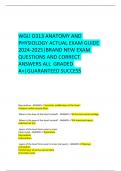
-
WGU D313 ANATOMY AND PHYSIOLOGY ACTUAL EXAM GUIDE 2024-2025|BRAND NEW EXAM QUESTIONS AND CORRECT ANSWERS ALL GRADED A+|GUARANTEED SUCCESS
- Exam (elaborations) • 43 pages • 2024
-
- $10.49
- 2x sold
- + learn more
WGU D313 ANATOMY AND PHYSIOLOGY ACTUAL EXAM GUIDE |BRAND NEW EXAM QUESTIONS AND CORRECT ANSWERS ALL GRADED A+|GUARANTEED SUCCESS Myocardium - ANSWER-muscular, middle layer of the heart. Contains cardiac muscle fibers Where is the base of the heart located? - ANSWER-At the third costal cartilage Where is the apex of the heart located? - ANSWER-5th intercostal space, midclavicular line Layers of the heart from outer to inner (Heart only) - ANSWER-Epicardium My...
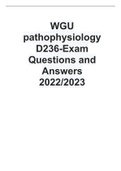
-
WGU pathophysiology D236-Exam Questions and Answers 2022-2023
- Exam (elaborations) • 43 pages • 2022
-
- $15.99
- 5x sold
- + learn more
WGU pathophysiology D236-Exam Questions and Answers 2022/2023 What is Starling's Law of Capillary forces? How does this explain why a nutritionally deficient child would have edema? - ANSWER Starling's Law describes how fluids move across the capillary membrane. There are two major opposing forces that act to balance each other, hydrostatic pressure (pushing water out of the capillaries) and osmotic pressure (including oncontic pressure, which pushes fluid into the capillaries). Bot...
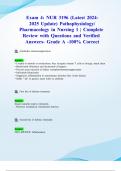
-
Exam 4: NUR 3196 (Latest 2024- 2025 Update) Pathophysiology/ Pharmacology in Nursing 1 | Complete Review with Questions and Verified Answers- Grade A -100% Correct
- Exam (elaborations) • 31 pages • 2024
- Available in package deal
-
- $10.99
- + learn more
Exam 4: NUR 3196 (Latest Update) Pathophysiology/ Pharmacology in Nursing 1 | Complete Review with Questions and Verified Answers- Grade A -100% Correct Q: Antibodies immunosuppression Answer: • Created in animals as medications; they recognize human T cells as foreign, attack them • Basiliximab (Simulect) and daclizumab (Zenapax) • Prevent acute rejection of kidney transplants Immunosuppressants • Infliximab (Remicade) • Suppresses inflammation in autoimmune disorders li...
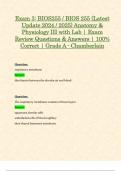
-
Exam 3: BIOS255 / BIOS 255 (Latest Update 2024 / 2025) Anatomy & Physiology III with Lab | Exam Review Questions & Answers | 100% Correct | Grade A - Chamberlain
- Exam (elaborations) • 24 pages • 2024
- Available in package deal
-
- $7.99
- + learn more
Exam 3: BIOS255 / BIOS 255 (Latest Update 2024 / 2025) Anatomy & Physiology III with Lab | Exam Review Questions & Answers | 100% Correct | Grade A - Chamberlain Question: respiratory membrane Answer: thin barrier between the alveolar air and blood Question: The respiratory membrane consists of three layers: Answer: squamous alveolar cells endothelial cells of blood capillary their shared basement membrane Question: Describe the layers of the pleura membrane and the l...
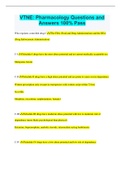
-
VTNE: Pharmacology Questions and Answers 100% Pass
- Exam (elaborations) • 38 pages • 2023
- Available in package deal
-
- $9.99
- 1x sold
- + learn more
VTNE: Pharmacology Questions and Answers 100% Pass Who regulates controlled drugs? The FDA (Food and Drug Administration) and the DEA (Drug Enforcement Administration) C-I Schedule I drugs have the most abuse potential and no current medically acceptable use Marajuana, heroin C-II Schedule II drugs have a high abuse potential and are prone to cause severe dependence Written prescription only (except in emergencies with written script within 72 hrs) No refills Morphine, oxycodone, amphetamines,...
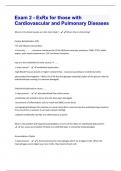
-
Exam 2 - ExRx for those with Cardiovascular and Pulmonary Diseases Questions With Correct Solutions, Already Passed!!
- Exam (elaborations) • 31 pages • 2024
- Available in package deal
-
- $7.99
- + learn more
Where in the blood vessels are clots most likely? - Where there is branching? Cardiac Rehabilitation (CR) • Ex and lifestyle interventions • Currently, ........... insurance reimburses for CR for MI/acute coronary syndrome, CABG, PTCA, stable angina, valve repair/replacement, CHF, and heart transplant. Injury to the endothelium (many causes) → ....... -2 main causes? - endothelial dysfunction... -high Blood Pressure (results in higher turbulent flow - excessive pounding on endotheli...
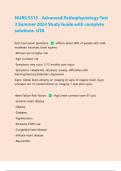
-
NURS 5315 - Advanced Pathophysiology Test 3 Summer 2024 Study Guide with complete solutions. UTA
- Exam (elaborations) • 54 pages • 2024
- Available in package deal
-
- $11.99
- + learn more
Post Concussive Syndrome -Affects about 80% of people with mild-moderate traumatic brain injuries -Women are at higher risk -Age increases risk -Symptoms may occur 3-12 months post injury -Symptoms: Headaches, dizziness, anxiety, difficulties with learning/memory/attention, depression Signs: Global brain atrophy on imaging & signs of organic brain injury (changes not r/t mental illness) on imaging 1 year post injury Heart Failure Risk Factors -Age (most common over 65 y/o) -Ischemic...

Do you wonder why so many students wear nice clothes, have money to spare and enjoy tons of free time? Well, they sell on Stuvia! Imagine your study notes being downloaded a dozen times for $15 each. Every. Single. Day. Discover all about earning on Stuvia


